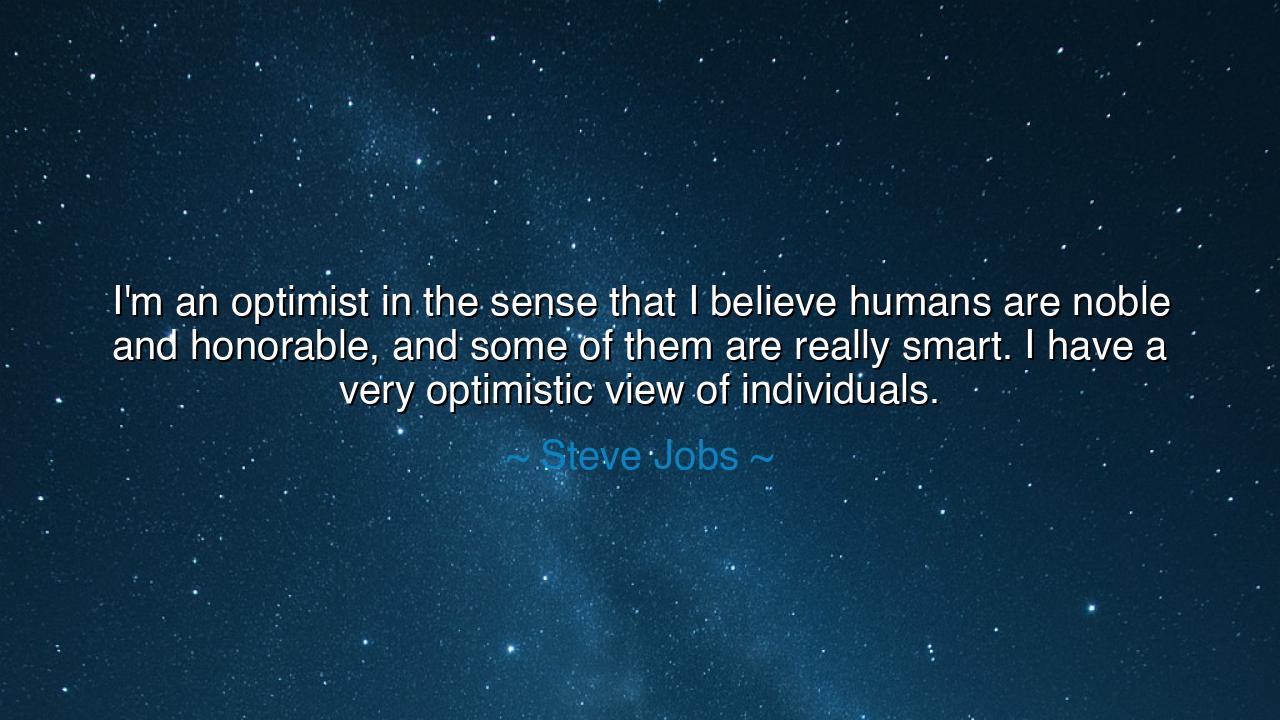
I'm an optimist in the sense that I believe humans are noble and
I'm an optimist in the sense that I believe humans are noble and honorable, and some of them are really smart. I have a very optimistic view of individuals.






In an age where cynicism too often passes for wisdom, Steve Jobs, the visionary of invention and simplicity, once spoke with the clarity of one who believed deeply in human potential: “I’m an optimist in the sense that I believe humans are noble and honorable, and some of them are really smart. I have a very optimistic view of individuals.” These words, simple yet luminous, reveal the foundation of his faith—not in systems, not in institutions, but in individuals, in the creative fire that dwells within each soul. It was this belief that shaped his life’s work, that allowed him to see not just what was, but what could be. For Jobs, optimism was not naïveté; it was courage—the courage to trust in humanity’s better nature.
The origin of this quote comes from interviews near the later years of Jobs’ life, when he reflected on the human condition, on creation, and on the spirit of innovation that drove him. Having lived through triumphs and defeats, through exile and return, he had seen both the brilliance and the frailty of mankind. Yet, rather than grow bitter, he chose to see the good—to believe that beneath our flaws lies a reservoir of nobility, waiting to be awakened. In these words, Jobs speaks not as a corporate titan, but as a philosopher of hope. His optimism is not blind faith; it is born from witnessing the greatness that emerges when a single individual dares to dream and act with integrity.
To believe that humans are noble and honorable is to see the divine spark within them. Jobs understood that while the world can be harsh and systems corrupt, the individual spirit is capable of astonishing beauty. Each person, he believed, carries within them a seed of greatness—a capacity to create, to love, to serve, and to elevate life itself. His view stands in contrast to the cynic, who sees only selfishness and folly. The optimist, as Jobs describes him, does not deny darkness but believes in the light’s power to overcome it. He looks upon humanity with compassion and awe, trusting that even in the broken, there is brilliance.
History, too, offers proof of this faith. Consider Nelson Mandela, who after twenty-seven years of imprisonment emerged not with vengeance, but with forgiveness. He believed, as Jobs did, in the honor and nobility of the human spirit—that even those who wronged him could be redeemed through understanding and compassion. Mandela’s optimism was not softness but strength—the strength to see beyond cruelty and to trust in humanity’s capacity for good. Like Jobs, he knew that to believe in people is to give them the chance to rise above themselves.
In this light, Jobs’ optimism becomes a philosophy of action. It is not enough to admire human potential; one must create the conditions for it to flourish. Jobs built teams not of perfect people, but of passionate individuals capable of greatness when inspired. He demanded excellence because he believed people were capable of it. He did not dwell on failure or doubt—he looked for possibility. To him, intelligence was not just cleverness, but the marriage of curiosity and courage—the willingness to think differently, to challenge, to invent.
His words also carry a hidden challenge for all of us. If he believed that humans are noble and honorable, then it is our duty to live in such a way that justifies that belief. To act with integrity even when unseen, to strive for excellence not for fame but for fulfillment, to treat others as vessels of potential rather than obstacles—this is what it means to live out Jobs’ optimism. He reminds us that the future is not built by skeptics, but by believers—those who trust that within the chaos of humanity lies the blueprint of greatness.
The lesson, then, is both timeless and urgent: believe in people. Believe in their goodness, in their intelligence, in their ability to rise beyond their limitations. Even when the world disappoints, hold to the conviction that the human heart is still capable of wonder. Seek the noble within yourself and awaken it in others. Look upon each person not as a stranger, but as a bearer of divine potential. For every advance in art, science, or kindness begins with one soul who dares to believe that humanity is worthy of hope.
Thus, my children of courage and imagination, remember the wisdom of Steve Jobs: be an optimist not because the world is perfect, but because people can be. See the light in others, and help it shine. For to believe in the nobility of humankind is not weakness—it is the seed of every invention, every revolution, every act of love that has ever lifted the world from darkness into dawn.






AAdministratorAdministrator
Welcome, honored guests. Please leave a comment, we will respond soon